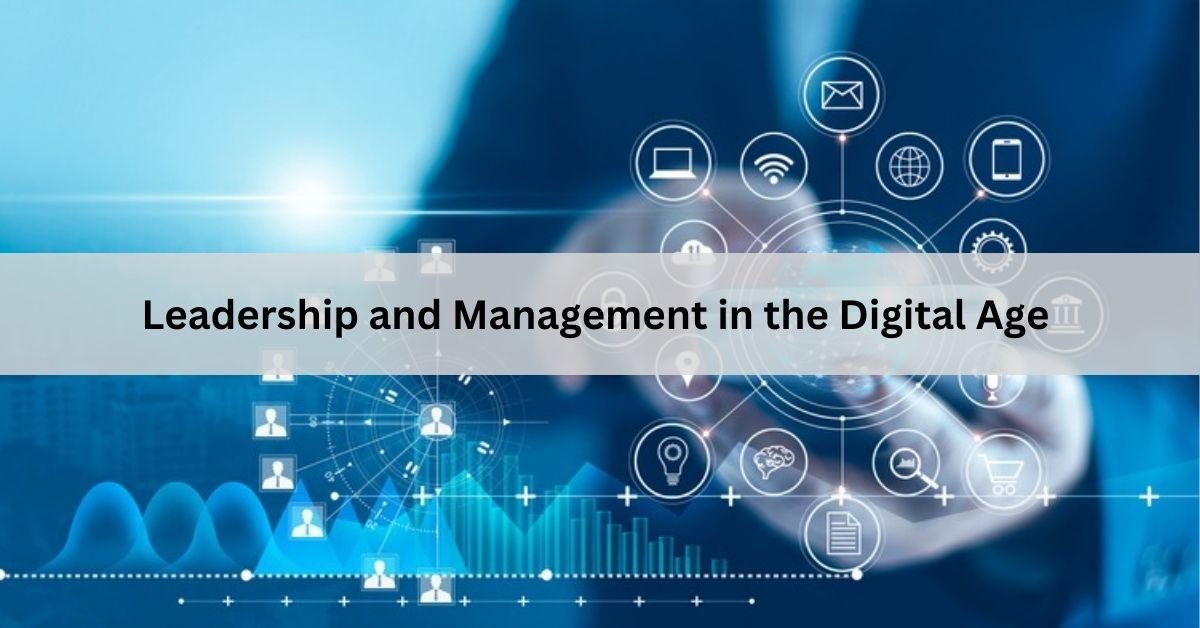Leadership and Management in the Digital Age – Navigating Challenges and Opportunities!
In the digital age, effective leadership and management are pivotal to navigating complexities, fostering innovation, and driving organizational success. This comprehensive guide explores key strategies—from agile leadership to continuous learning—that empower leaders to thrive in a dynamic and interconnected business environment. Discover how embracing emotional intelligence, remote team building, and adaptive organizational structures can elevate leadership practices and cultivate high-performing teams.
Agile Leadership Practices: Embracing Flexibility and Adaptability
Agile leadership practices emphasize flexibility, responsiveness, and iterative decision-making to navigate rapid changes and uncertainties in the digital landscape. Leaders prioritize collaboration, empower teams to self-organize, and foster a culture of innovation and continuous improvement. Agile methodologies, such as Scrum and Kanban, streamline workflows, enhance productivity, and accelerate project delivery. By embracing agile principles, leaders cultivate resilience, promote adaptive thinking, and drive organizational agility to seize opportunities and mitigate risks in dynamic markets.
Emotional Intelligence in Management: Fostering Resilient Relationships
Emotional intelligence (EI) equips managers with the ability to understand, manage, and leverage emotions to foster productive relationships and enhance team dynamics. EI skills, including self-awareness, empathy, and effective communication, promote trust, collaboration, and conflict resolution within teams. Managers with high EI empower employees, inspire loyalty, and cultivate a positive work environment conducive to creativity and innovation. By prioritizing EI development, leaders nurture resilient teams, improve decision-making outcomes, and elevate organizational performance in the digital age.
Remote Team Building Strategies: Cultivating Collaboration Across Borders
Remote team building strategies focus on fostering cohesion, trust, and engagement among geographically dispersed teams. Virtual team-building activities, regular video meetings, and informal communication channels build rapport and strengthen interpersonal connections. Leaders leverage technology to facilitate virtual workshops, team challenges, and social events that promote camaraderie and collaboration. By promoting inclusivity and recognizing individual contributions, remote team building fosters a sense of belonging, enhances productivity, and sustains team morale in remote work environments.
Crisis Leadership and Decision-Making: Navigating Uncertainty with Confidence
Crisis leadership requires decisive action, effective communication, and strategic decision-making to mitigate risks and navigate disruptions effectively. Leaders prioritize transparency, provide clear guidance, and mobilize resources swiftly during crises. Scenario planning, risk assessments, and crisis simulations prepare leaders to anticipate challenges, adapt strategies, and maintain business continuity. By demonstrating resilience and empathy, crisis leaders inspire confidence, instill trust, and guide organizations through adversity with agility and composure.
Coaching and Mentorship Programs: Developing Future Leaders
Coaching and mentorship programs cultivate talent, enhance leadership capabilities, and drive professional growth within organizations. Formal mentoring relationships pair experienced leaders with mentees to provide guidance, share insights, and facilitate career development. Coaching interventions focus on goal setting, skills development, and performance improvement through constructive feedback and personalized development plans. By investing in mentorship and coaching initiatives, organizations empower future leaders, foster succession planning, and nurture a pipeline of talent capable of driving innovation and sustained success.
Adaptive Organizational Structures: Embracing Flexibility and Innovation
Adaptive organizational structures promote flexibility, agility, and cross-functional collaboration to respond to market dynamics and customer needs swiftly. Matrix organizations, agile frameworks, and decentralized decision-making empower teams to innovate, iterate, and adapt strategies in real-time. Leaders flatten hierarchies, encourage knowledge sharing, and foster a culture of experimentation and continuous learning. By embracing adaptive structures, organizations enhance responsiveness, accelerate innovation cycles, and optimize resource allocation to capitalize on emerging opportunities and stay ahead in competitive markets.
Employee Empowerment and Autonomy: Cultivating Ownership and Innovation
Employee empowerment and autonomy enable individuals to take ownership of their work, make informed decisions, and drive innovation within their roles. Leaders delegate authority, encourage autonomy, and provide resources and support to foster creativity and initiative. Empowered employees feel valued, motivated, and accountable for achieving organizational goals. By fostering a culture of trust and empowerment, leaders unleash untapped potential, inspire innovation, and cultivate a resilient workforce capable of adapting to change and driving sustained organizational growth.
Continuous Learning and Development: Investing in Lifelong Skills
Continuous learning and development initiatives equip leaders and employees with the skills, knowledge, and capabilities needed to thrive in a rapidly evolving digital landscape. Leaders promote a growth mindset, encourage ongoing skill development, and invest in training programs that align with strategic objectives and emerging industry trends. Learning opportunities, such as workshops, certifications, and online courses, empower individuals to acquire new competencies, stay abreast of technological advancements, and adapt to changing market demands. By prioritizing continuous learning, organizations foster a culture of innovation, resilience, and agility essential for long-term success in the digital age.
Conclusion: Elevating Leadership in the Digital Era
In the digital age, effective leadership and management are indispensable for navigating complexities, fostering innovation, and driving organizational success. By embracing agile practices, cultivating emotional intelligence, and prioritizing continuous learning, leaders empower teams to thrive amidst change and uncertainty. Remote team building, crisis leadership, and adaptive structures enable organizations to respond swiftly to challenges and capitalize on opportunities. Investing in coaching, mentorship, and employee empowerment fosters a culture of growth, innovation, and resilience essential for sustained competitiveness and leadership in the evolving business landscape. Embrace transformative leadership practices to inspire greatness, drive organizational excellence, and shape a prosperous future in the digital era.







